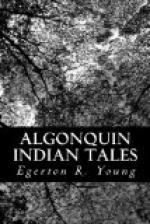That evening before the children were sent to bed they overheard Jakoos, who had come to the house with venison to sell, telling in the kitchen a story that he had heard from Souwanas about a naughty fellow, called Maheigan, who tried to capture a beautiful kind-hearted maiden, Waubenoo, and of how Nanahboozhoo thrashed him, and then afterward, because of some naughty children not holding their tongues, Waubenoo was turned into the Whisky Jack.
What the little children overheard had very much excited their curiosity, and so when Mary was putting them to bed they demanded from her the full story.
As this was one of the Saulteaux Indian legends, while Mary was a Cree, she was not familiar with it. She told the children that she knew nothing about it, but this by no means set their curiosity at rest.
CHAPTER IV.
The Love Story of Wakontas—His Test of the Two Maidens—His Choice—The Transformation of Misticoosis.
A few days later Mary was annoyed by having the children tell her frankly that they did not think she was a first-class story-teller. For if she had been she ought to have been able to answer Minnehaha’s question about what Nanahboozhoo did to Maheigan when he tried to catch Waubenoo.
Mary was vexed at herself that she was unable to answer the question, for she well knew that the children would not rest satisfied until they had the story told them by some one, possibly Souwanas himself. Indeed, knowing them so well, she had fully resolved to post herself from one of the noted story-tellers who have all the Indian legends at their tongue tips. But as yet she was ignorant in this matter, and therefore fell considerably in the children’s estimation. Alary was somewhat hurt by noticing, perhaps for the first time, Sagastao and Minnehaha whispering confidentially to each other. The children conversed with Mary only in her own language, which at that time they perhaps understood better than they did English. Now, much to Mary’s annoyance, their confidential whisperings were carried on in English. Being sensitive and quick-tempered, when she saw this sudden break in their affections toward her she was inclined to resent it, and asked the reason why she was not allowed to know what they were talking about.
Blunt little Sagastao spoke up at once:
“Minnehaha and I have talked it over, and have decided that unless you tell us better stories, and ones which you know all about, we’re going to run away to the wigwam of Souwanas.”
This was humiliating and distressing news. Mary fancied she had told them a good story, and that with a few others like it she could satisfy their curiosity and keep them at home until the brief summer would have passed. Not so, however, thought the children. They saw their advantage and were resolved to keep it, and when their lessons were over and they were left entirely in the charge of Mary they taxed the little woman in a way that obliged her to exercise all her gifts as a story-teller, and she was far from being a poor one.




